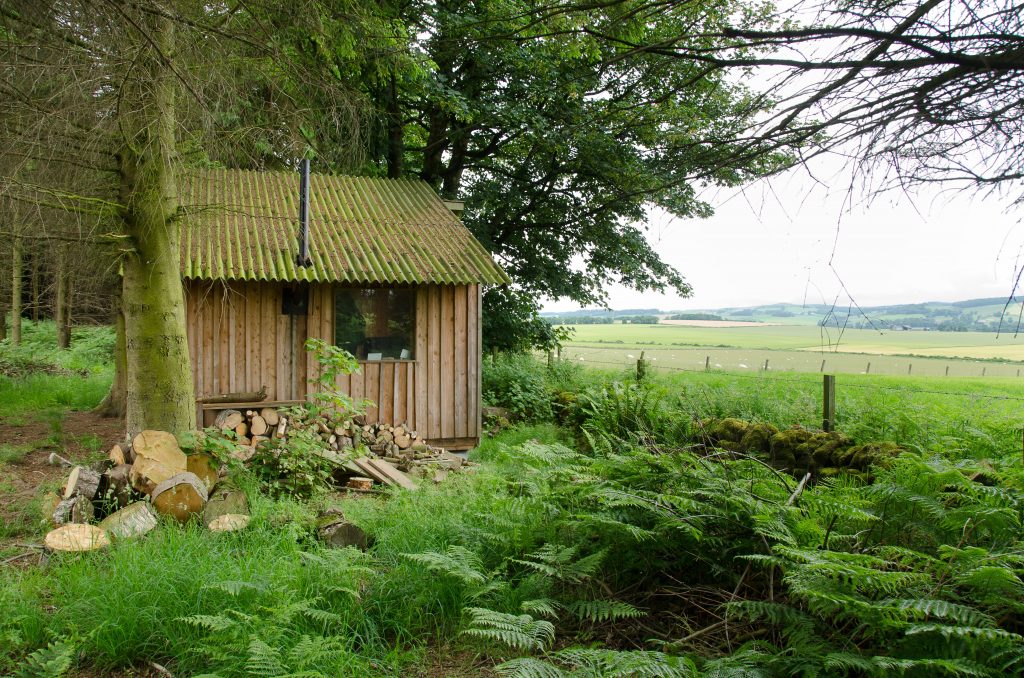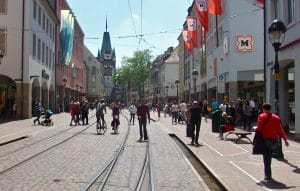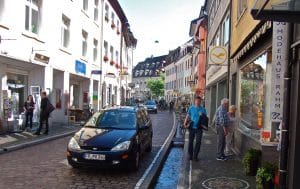It’s a simple concept: a little hut in the woods; a place to spend some time outdoors; reconnect with the real world. There are hytte all over Scandinavia and northern Europe, so why not here?
It’s a simple building: made from local timber; maybe self-built; easily removed at the end of its life.
And it’s one simple step to create the policy framework: add a concise definition of a hut to Scottish Planning Policy and watch the verbose hutting movement take physical form.
Off we go then.  We recently submitted a planning application for a pilot project by Reforesting Scotland, the group that’s done more than anyone to promote hutting in Scotland, through its 1000 Huts Campaign. Working with Forestry Commission Scotland on a site at Carnock Wood by Saline in Fife, Reforesting Scotland plans 13 huts, one of which is intended for educational use.
We recently submitted a planning application for a pilot project by Reforesting Scotland, the group that’s done more than anyone to promote hutting in Scotland, through its 1000 Huts Campaign. Working with Forestry Commission Scotland on a site at Carnock Wood by Saline in Fife, Reforesting Scotland plans 13 huts, one of which is intended for educational use.
We’ve tried to keep it simple. We helped Reforesting Scotland set out information for this kind of development in their guidance for “New Hutting Developments”, published in 2016. We’ve now sought to create a template through this planning application to make it easier for others to follow. The application documents can be viewed here.
A quick look at the application file online and you’ll realise that simplicity only goes so far. The planning system hasn’t handled many hutting applications in recent years, as there are so few huts in Scotland and barely any have been built in recent times. Planning authorities need to be confident that they aren’t opening the door to inappropriate development. They want to know what the huts will look like. They want to know about any potential impacts on ancient woodland, habitat and protected species, road safety and landscape setting, flooding and core paths. They want to know how people will travel to the huts, how they will use them, how the site will be managed.
Sometime soon, a simpler planning application process may be possible. Once a body of hutting evidence has emerged, we can all campaign for a lighter-touch approach to the planning process, for this lighter-touch form of development. If Simplified Planning Zones are acceptable for housing and employment, then why not huts?
For now, this seems like a big step forward. There’s more work to be done but the planning application takes us closer to making huts available for people who want them. And we know lots of people want them….
More Freiburg Views
If you’re looking for an enlightened place to be, they say you need look no further than Freiburg. Having heard all about the place at an RTPI Scotland annual Geddes lecture and blogged glowingly about it, it seemed only right to finally make a visit.
 Freiburg has a well-earned reputation for environmentalism, people-friendly streets and welcoming spaces. It’s known as a town that cares about design, sustainability and renewable energy. It’s a place where decision makers have taken decisions and got things done, rather than fudged and fumbled and left future administrations to deal with the consequences. We’ve been talking for decades about the possibilities of public sector-led advance infrastructure. They’ve been doing it for decades, including social facilities like schools and nurseries.
Freiburg has a well-earned reputation for environmentalism, people-friendly streets and welcoming spaces. It’s known as a town that cares about design, sustainability and renewable energy. It’s a place where decision makers have taken decisions and got things done, rather than fudged and fumbled and left future administrations to deal with the consequences. We’ve been talking for decades about the possibilities of public sector-led advance infrastructure. They’ve been doing it for decades, including social facilities like schools and nurseries.
It sounds so different to our typical experience at home. The strange thing is, at face value it doesn’t look that different – it’s just a town, albeit an attractive and highly functional one. It has streets and spaces, parks and shops, historic buildings and new ones. People go about their business. At first glance you might think it’s a lot like your own town.
Pretty soon, the differences dawn. A main street with a fully shared surface, filled by cyclists, pedestrians and what we would think of as deadly trams. There are few cars but to spice things up there are open water channels a foot wide and a foot deep weaving along the streets. The local population (and visitors) seem to avoid falling down these bächle – historic water supply and fire fighting features. Instead, kids sail boats in them, pull strings of colourful plastic ducks or paddle in them in summer. The trams and cyclists and pedestrians continue on their way. It’s a traffic engineer’s hell. A health and safety officer’s hell. A car driver’s hell.
 Elsewhere, a back lane of recycling workshops, themselves built from recycled huts, trailers, camper vans and buses is a hive of activity, employment and social exchange. It looks like a Jane Jacobs dream come true. A tax inspector’s hell. A building inspector’s hell. A planner’s hell. It works. You wouldn’t get away with it here….
Elsewhere, a back lane of recycling workshops, themselves built from recycled huts, trailers, camper vans and buses is a hive of activity, employment and social exchange. It looks like a Jane Jacobs dream come true. A tax inspector’s hell. A building inspector’s hell. A planner’s hell. It works. You wouldn’t get away with it here….
The housing neighbourhood we stayed in had a communal space – a simple courtyard with some seats, a few trees and loads of bicycle stands. It functions as a multipurpose local square for kids play, mini-markets, music events, local festivals, bike repair workshops, whatever, whenever. We have plenty similar spaces here, although many of them are a sop to open space standards. It takes more than the space to make this activity happen. It’s a state of mind.
That state of mind may come from confidence amongst those who live in and visit Freiburg that this is a town where quality of life matters. It’s a place where many people seem to feel like they have a share in the vision and a personal responsibility to deliver. It’s what the drive for community empowerment in Scotland is all about.
Then again, many people we met seemed happy just to get on with their lives, as if this really was just another town. And like any other place, there’s still dissatisfaction with politicians, public servants and private interests. Some things are the same everywhere.
But still, some things are different.
